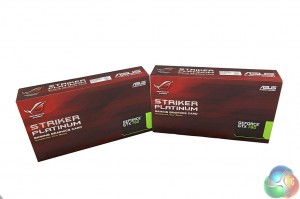
The Asus ROG Striker Platinum GTX760 graphics cards arrive in a traditionally styled Republic Of Gamers box, with the product name and some details highlighted.
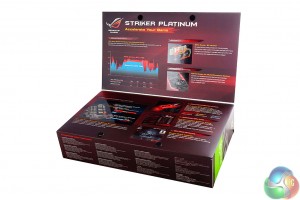
The boxes open up, detailing some specifications of the hardware inside. Asus focus on the build quality of the Striker Platinum graphics cards and the high grade components used. I will expand on this when the cooler is removed.
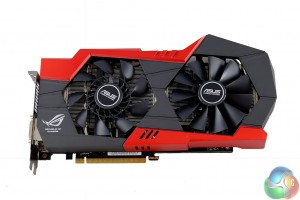
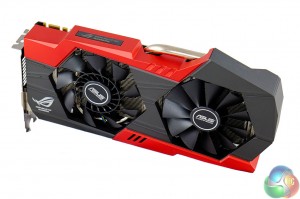
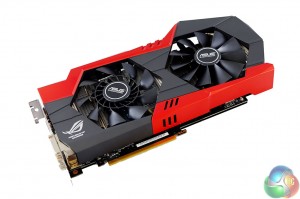
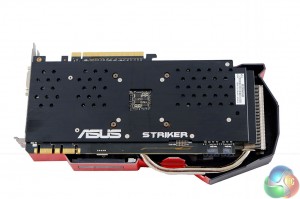
The Asus ROG Striker Platinum GTX760 is a striking graphics card – the angular edges give it a rather menacing appearance. I know this will be very much personal taste – but I absolutely love the looks. Reassuringly, the build quality is exceptionally high.
It is worth pointing out that these are heavy dual slot cards, measuring 11.3 x 6 x 1.6 inches. A matt coloured metal backplate is fitted to the PCB, offering protection and enhancing cooling performance.
CoolTech Fan Technology is a hybrid design and offers dust proofing. The hybrid blades and bearing design, with inner radial blower and outer flower type blades provides multi directional airflow.
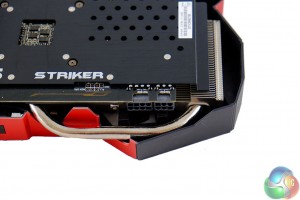
Each card takes power from a single 6 pin and 8 pin PCIe connector.
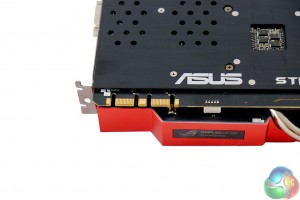
The Striker Platinum GTX760 is fully SLi capable, fitted with two connectors.
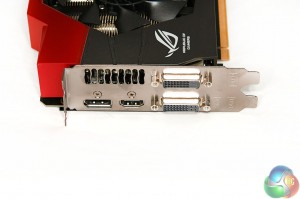
There are two DVI connectors fitted, alongside a full sized HDMI and DisplayPort connector.
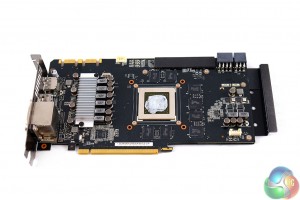
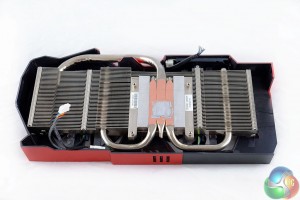
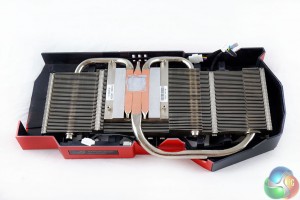
Asus are using SKHynix GDDR5 memory and they have adopted Japanese made Nichicon GT series black metallic capacitors to aid with longevity (10,000 hours, up from standard 2,000 hour ratings) and stability. The PCB is using an 8 Phase power implementation with digital voltage regulation. Other goodies include concrete core chokes and hardened MOSFET's. Asus claim this card will not suffer from annoying ‘whines' and ‘buzzes'.
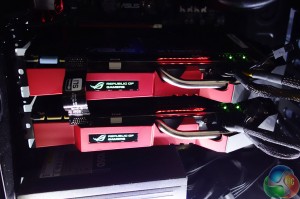
The ‘Republic Of Gamers' logo on the card is colour coded. It will change colour depending on the load. The light blue/greenish colour is Light Loading, Yellow is Medium Loading and Red is Heavy Loading.

An overview of the hardware in the latest version of GPU. The Asus ROG Striker Platinum GTX760 is clocked at 1,085mhz, with a boost speed of 1,150mhz. The 4GB of SKHynix GDDR5 memory is clocked at 1,502mhz (6Gbps effective). The GK104 core is built on the 28nm process and has 32 ROP's, 96 Texture units and 1,152 Cuda Cores.
 KitGuru KitGuru.net – Tech News | Hardware News | Hardware Reviews | IOS | Mobile | Gaming | Graphics Cards
KitGuru KitGuru.net – Tech News | Hardware News | Hardware Reviews | IOS | Mobile | Gaming | Graphics Cards



I know they have less memory on board, but how would a couple of 3GB R9 280x’s in crossfire fare against these?
How come the 6GB 780 is thrashing the 780TI’s in the Ungine benchmarks? Surely they don’t require that much ram?
Oh I see, it’s 2 in SLI.